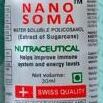In recent years, the field of nanotechnology has revolutionized many industries, from pharmaceuticals to agriculture, and one of its most promising applications is the development of nanoemulsions. These tiny droplets, often measuring less than 100 nanometers in size, have been shown to dramatically enhance the efficacy and performance of various compounds, including long-chain alcohols. As researchers and industries increasingly explore the benefits of nanoemulsions, the implications for product formulations, delivery systems, and overall efficiency are nothing short of transformative.
Understanding Nanoemulsions
Nanoemulsions are stable mixtures of oil and water, facilitated by surfactants that reduce interfacial tension, allowing for the dispersion of one liquid in another. The key characteristic of nanoemulsions is their minute droplet size, which enhances the surface area available for interaction with biological systems, improving solubility, bioavailability, and stability. This greater surface area enables active ingredients to be more readily absorbed and utilized in various applications.
Why Long-Chain Alcohols?
Long-chain alcohols, typically characterized by hydrophobic properties due to their elongated carbon chains, have applications in various industries including cosmetics, pharmaceuticals, biofuels, and food. However, their hydrophobic nature limits their solubility in water-based systems, posing challenges in formulation and delivery.
By leveraging nanoemulsion technology, these long-chain alcohols can be effectively solubilized in aqueous formulations, enhancing their functionality and usability across a wide range of applications.
Enhancing Performance with Nanoemulsions
The integration of nanoemulsions in long-chain alcohol applications has profound implications:
1. Improved Bioavailability
In pharmaceuticals, the bioavailability of active compounds is crucial. Nanoemulsions enhance the absorption of long-chain alcohols in the gastrointestinal tract, allowing for more effective delivery of therapeutic agents. This can lead to lower dosages required, minimizing potential side effects while maximizing therapeutic benefits.
2. Enhanced Stability
One of the challenges with long-chain alcohols is their tendency to oxidize and degrade over time. Nanoemulsions have shown to provide improved stability against environmental factors such as light and air. This enhancement extends the shelf life of products and maintains their efficacy, especially in formulations like skincare products where oxidation can lead to degradation.
3. Increased Efficiency in Formulations
In industrial applications, long-chain alcohols often need to be mixed with water-based formulations. Traditional methods may require significant energy and time to achieve uniform dispersion. The use of nanoemulsions allows for rapid blending and dilution, resulting in more efficient processing, lower energy consumption, and cost savings.
4. Targeted Delivery Systems
Nanoemulsions can be engineered to control the release rates of long-chain alcohols in targeted applications. This capability is particularly beneficial in fields like cosmetics and pharmaceuticals where prolonged effect is desirable. For example, a nanoemulsion can encapsulate long-chain alcohols in a way that slowly releases them over time for sustained moisturizing effects on the skin or sustained therapeutic action in medication.
Applications in Various Industries
The benefits of nanoemulsions extend across diverse sectors:
Cosmetics
In cosmetics, nanoemulsions offer improved penetration of long-chain alcohols into skin layers, enhancing moisturizing, anti-aging, and sensory qualities in creams, lotions, and serums. This technology presents a pathway for more natural formulations that offer superior performance without the need for synthetic additives.
Food and Beverage
In the food industry, the solubility of long-chain alcohols can be enhanced for flavor delivery or preservation. Nanoemulsions have shown promise in developing more robust flavor profiles and shelf-stable products, allowing for innovative culinary applications and improved sensory experiences for consumers.
Pharmaceuticals
In drug formulations, nanoemulsions facilitate the incorporation of otherwise poorly soluble long-chain alcohols, leading to more effective medications. This approach can be especially beneficial for pain management or anti-inflammatory therapies where enhanced delivery is crucial for therapeutic efficacy.
Agriculture
In agricultural applications, nanoemulsions can enhance the delivery of active ingredients in pesticides or fertilizers, improving plant uptake and minimizing environmental runoff. Long-chain alcohols play a role in improving the adherence and performance of these applications.
Challenges and Future Directions
While the prospects for nanoemulsions and long-chain alcohols are exciting, there are challenges to address. Scale-up for commercial production, regulatory hurdles, and consumer acceptance remain key areas for further study and development. Additionally, ongoing research is crucial to fully understand the long-term implications of nanoemulsion use, particularly regarding safety and environmental impact.
As researchers continue to explore the interplay between nanoemulsions and long-chain alcohols, the potential for innovative applications and improved formulations is vast. The future looks bright as we harness the power of tiny drops to create products with big impacts across industries, ultimately benefiting consumers and enhancing the performance of established and emerging applications alike.
